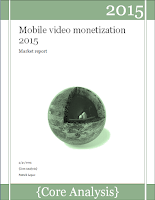Data traffic optimization in wireless networks has reached a mature stage as a technology . The innovations that have marked the years 2008 – 2012 are now slowing down and most core vendors exhibit a fairly homogeneous feature set.
The difference comes in the implementation of these features and can yield vastly different results, depending on whether vendors are using open source or purpose-built caching or transcoding engines and whether congestion detection is based on observed or deduced parameters.
Vendors tend nowadays to differentiate on QoE measurement / management, monetization strategies including content injection, recommendation and advertising.
Here is a list of commonly implemented optimization techniques in wireless networks.
- TCP optimization
- Buffer bloat management
- Round trip time management
- Web optimization
- GZIP
- JPEG / PNG… transcoding
- Server-side JavaScript
- White space / comments… removal
- Lossless optimization
- Throttling / pacing
- Caching
- Adaptive bit rate manipulation
- Manifest mediation
- Rate capping
- Lossy optimization
- Frame rate reduction
- Transcoding
- Online
- Offline
- Transrating
- Contextual optimization
- Dynamic bit rate adaptation
- Device targeted optimization
- Content targeted optimization
- Rule base optimization
- Policy driven optimization
- Surgical optimization / Congestion avoidance
- Congestion detection
- TCP parameters based
- RAN explicit indication
- Probe based
- Heuristics combination based
- Encrypted traffic management
- Encrypted traffic analytics
- Throttling / pacing
- Transparent proxy
- Explicit proxy
- QoE measurement
- Web
- page size
- page load time (total)
- page load time (first rendering)
- Video
- Temporal measurements
- Time to start
- Duration loading
- Duration and number of buffering interruptions
- Changes in adaptive bit rates
- Quantization
- Delivery MOS
- Spatial measurements
- Packet loss
- Blockiness
- Blurriness
- PSNR / SSIM
- Presentation MOS
An explanation of each technology and its feature set can be obtained as part of the mobile video monetization report series or individually as a feature report or in a workshop.


No comments:
Post a Comment